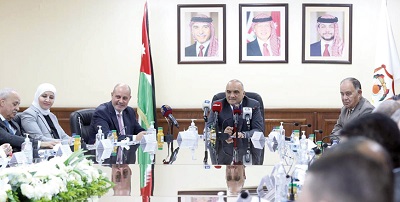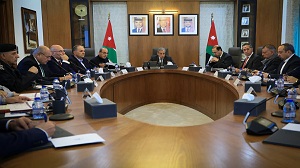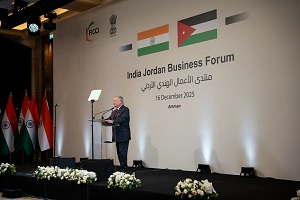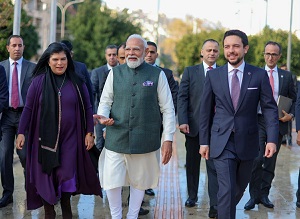PM checks on market-monitoring mechanisms ahead of Ramadan

The Jordan Times
AMMAN — Prime Minister Bisher Khasawneh on Wednesday met with representatives from the industrial, commercial and agricultural sectors, as well as regulatory authorities and civil and military consumer institutions, to emphasise the importance of selling goods at reasonable prices, particularly during the holy month of Ramadan.
During the annual meeting ahead of the holy month, Khasawneh commended the private sector's role in the industrial, commercial and agricultural sectors, describing private sector institutions as key partners in supporting and assisting citizens.
The global food index rose to 28 per cent and then 14 per cent during 2020 and 2021, respectively, the highest percentage the Kingdom has witnessed since 1990, he said. The price of a barrel of oil hit a record high last year, reaching approximately $130, the prime minister added, also noting that the prices of some basic commodities, such as vegetable oils, have risen as well.
Despite all challenges, public-private sectors institutions in the industrial, commercial and agricultural sectors have allowed the Kingdom to absorb these cumulative shocks, maintain acceptable inflation rates, ease citizens’ burdens, meet the public’s basic needs and maintain a secure and sufficient strategic food stock at reasonable prices, amid rising global prices and disruptions in supply chains, the premier said.
Minister of Industry, Trade, and Supply and Minister of Labour, Youssef Al Shamali, provided an overview of preparations for organising markets during Ramadan. The ministry is implementing a computerised system to monitor the availability of basic goods and materials, he said.
There will be no shortage of food and basic commodities during the holy month, as there is a sufficient stock of wheat for a year and a half, and an 11-month stock of barley, he affirmed, noting that basic commodities prices are 10 per cent lower this year than they were during Ramadan last year.
Regarding the availability of red meat, Shamali noted that a shipment of meat was imported from Brazil last week, confirming that there will be no problem with the availability of red meat in the market.
The ministry likewise has the legal tools necessary to deal with any increase in commodity prices, including setting price ceilings for any product with unjustifiable rises in prices, he said.
Minister of Water and Irrigation and Acting Minister of Agriculture, Mohammad Najjar, said that the total quantities of vegetables and fruits arriving to the central market are higher than during the same period last year, with prices decreasing by between 20 to 30 per cent.
Regarding the availability of red meat, he pointed out that the door was opened last week for meat imports from Brazil, stressing that there will be no problem with the availability of red meat in the market.
As for poultry, the Acting Minister of Agriculture confirmed that there is about 90 per cent self-sufficiency in the local poultry market, noting that despite the opening of poultry imports, the quantities available in the markets are sufficient to meet the Kingdom's needs.
The directors of the civil and military consumer institutions, the president of the Jordan Chamber of Industry and representatives of commercial sectors presented their preparations to provide essential goods during the holy month of Ramadan, stressing that all goods are available at significantly reduced prices.
Latest News
-
 Defective used gas Heaters behind recent suffocation deaths — probe
Defective used gas Heaters behind recent suffocation deaths — probe
-
 Trump imposes full travel bans on seven more countries, Palestinians
Trump imposes full travel bans on seven more countries, Palestinians
-
 King, India PM attend opening session of India-Jordan Business Forum
King, India PM attend opening session of India-Jordan Business Forum
-
 Crown Prince accompanies India PM on visit to Jordan Museum
Crown Prince accompanies India PM on visit to Jordan Museum
-
 Jordan beat Saudi Arabia to reach Arab Cup final
Jordan beat Saudi Arabia to reach Arab Cup final